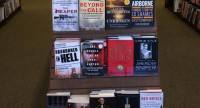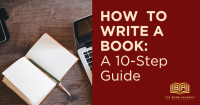How to write a book review

By Patricia Fry
firstwriter.com – Saturday July 29, 2006
Every author wants to have his/her book reviewed. It’s a good way to get exposure for their books and exposure computes into sales. With the rise in the number of new authors each year, there’s a greater need for book reviewers.
If you are a freelance writer, consider adding book reviews to your writing repertoire. There’s money to be made and a measure of notoriety in writing book reviews. There are also numerous opportunities for the book reviewer. For example:
You can join a stable of book reviewers at a book review Web site or magazine such as Midwest Book Review (www.midwestbookreview.com), Richmond Review (www.richmondreview.co.uk), Complete Review (www.complete-review.com) or Historical Novel Society (www.historicalnovelsociety.org). Alternatively, consider contacting Kirkus Reviews Magazine, Bibliophilos, Book Magazine or Library Journal about writing reviews for them (contact information below). As a matter of fact, Publishers Weekly is currently seeking reviewers (www.publishersweekly.com).
Submit reviews to general magazines that publish reviews or magazines dedicated to a specific interest: horses, gardening, memoirs, parenting, romance or travel, for example. If the magazine doesn’t already publish reviews, suggest a book review column. This is particularly feasible with a newer magazine. Here’s a partial list of magazines with book review columns: Grandparents Magazine, Mothering Magazine, Today’s Christian Woman, Fine Gardening, Christian Home and School, African Voices, Indiana Review, and Iconclast (contact information below).
Alternatively, offer to write and submit reviews for authors for a fee. I’m currently paying a couple of writers to write reviews and submit them to appropriate magazines, newsletters and websites. Of course, if the magazine pays for submissions, the reviewer makes even more on the deal. Some website managers and magazine / newsletter editors post or publish reviews, but they don’t do the reviews in house. This is a great opportunity for someone who likes to read, has an opinion, is good with detail, is a skilled writer, and knows how to hustle work.
Here are the basics of writing a book review:
Choose books carefully. You might be better at reviewing the type of books that you are accustomed to and enjoy reading: mysteries and true crimes, young adult novels or nonfiction books in a particular subject, for example.
Make notes while reading the book. I frequently review books related to writing and publishing for SPAWNews (the newsletter for SPAWN – Small Publishers, Artists and Writers Network). While reading the book, I note passages that I particularly like, areas where the material is especially strong (or weak), chapters where I find unique or important bits of information and so forth. I note the way the book is organised, whether it is well-written or not, what makes it appealing or useful, why this book is different and who will benefit from the material in this book.
Reflect on the book. When I finish a book, I spend a few moments or hours thinking about it. How did it affect me? What were my impressions? What is the point and the purpose of the book – to teach / educate, guide, inform, inspire or entertain? Did the author fulfil his promise to readers?
What is the purpose of a book review?
A book review is meant to help other people decide whether or not they want to or should read this book. A book review is a summary of the book. It describes the book and provides potential readers with both the positive and any negative aspects of the book.
Most of us have written book reports. A book review differs from a book report in that, not only does it tell about the book, it also critiques it. I often complain, in my book reviews, when a good reference book for writers doesn’t have an index, for example.
What is your job as a book reviewer?
Point out the appropriate audience for the book. Who would benefit most from this book or enjoy this book most. I won’t recommend a cutesy book of cat-inspired writing to a beginning writer who is seeking information. Likewise, I won’t suggest that an experienced author should read a basic book written for new writers.
Reviewers for my book, The Right Way to Write, Publish and Sell Your Book typically say that this book is for anyone who is interested in writing a book. It’s not for freelance writers who have no desire to produce a book. It’s not necessarily for seasoned authors. But it is for the hopeful or the struggling author and this is how most reviewers describe it.
Consider the audience while writing the book review. I review books that I can use and learn from and I review books that are pretty elementary. For solid reference books, I am part of the audience. I can write from my own perspective. For beginning books or inspirational books, I really must consider another audience while I am formulating the review. Here are some ideas:
Write something fresh about the book. I’ve had people write reviews for my books simply by copying the back cover matter. That’s a rather lazy approach. Be creative. Have fun. Come up with material that is unique and interesting, yet appropriate.
Be creative in choosing a style for your review. For fiction, you will probably want to evaluate characters and the plot. For nonfiction, analyse how complete the book is, whether it is useful and well-presented. If you review books in a category that you are familiar with, you’ll be more qualified to define the book’s strengths and weaknesses – what works and what doesn’t.
What if you hate the book?
Not every reviewer (or reader) is going to like every book. And the more familiar you are with the genre that you are reviewing, the more critical you will become. You know what you like. You know what touches you, makes you think, makes you laugh or cry. Sometimes you’re going to read a book that you really don’t like. What do you do with that? Either refuse to review the book or go ahead and review it revealing what you think would make it better. Many books are POD today and, if you firmly believe that your comments are important, maybe the author would consider making changes with the next printing.
Perhaps the book just isn’t your cup of tea or maybe it truly does have some problems. If you choose to review a bad book or one that you hate, you can do it in one of two basic ways. Either bash the book or use the sandwich method. That is, mention a positive aspect of the book, then reveal your negative point of view and then end by stating something good about the book. If the magazine you’re writing for really likes critical reviews, go ahead and bash the book, if you want and if you think it deserves it and if you don’t mind the possible consequences.
I produced a book a few years ago in which one paragraph was repeated. Hours before the book was to go to the printer, I made a change. I asked my typesetter to move a paragraph. He did, but neither of us noticed, during our last “too” quick look, that he neglected to remove the paragraph from the original spot. One reviewer really bashed that book. She saw the repeated paragraph and that was all she focused on throughout her entire review. It was like she had gotten up on the wrong side of the bed or that she had a vendetta against someone – me? Or what I or my writing represents?
She practically told readers that they should not read this book because of the numerous repeats throughout the book. If you see something you don’t like or that is blatantly wrong with a book you are reviewing, mention it if you must – especially if you feel that readers would be affected in some way by the message, information or presentation. But, if you see value in the book, talk about that, as well.
What else should you include in your book review?
Write a book review in essay form. It should have a beginning, middle and end. It should be written clearly and concisely. You’ll describe the book and reveal who the book is for. Sometimes the author doesn’t make this obvious and you’ll have to make that call.
Include the author’s qualifications for writing this book. Is he the author of 25 other mysteries? Is she an attorney? Are they practicing psychologists? In the case of my own books, reviewers always refer to my extensive background in writing and publishing.
A book review generally encompasses 150 to 300 words. Some magazine editors or webmasters might request one that is longer.
Before you finalise the review, always make sure that you list (either at the beginning or the end of the review), the full title, subtitle, author’s name, publishing company, ISBN, page number, price and ordering information.
Writing book reviews isn’t for everyone. I believe you must have a love of books – at least the type of books you are reviewing. You really should have a fairly optimistic, positive, but realistic outlook. It’s important that you can project from an appropriate audience’s point of view. Having good writing skills is a major plus.
Additional book review magazines / sites
- Kirkus Reviews: kirkusrev@kirkusreviews.com
- Library Journal: www.libraryjournal.com
- A Romance Review: www.aromancereview.com
-
California Literary Review: www.calitreview.com
Specialty magazines that publish book reviews
-
Bibliophilos: Contact: Dr. Gerald Bobango, 200 Security Building, Fairmont, WV 26554, United States
-
Innerself Magazine: www.innerself.com
-
Grandparents Magazine: 281 Rosedale Ave., Wayne, PA 19087, United States
-
Mothering Magazine: Contact: Ashisha, POB 1690, Santa Fe., NM 87504, United States
-
Today’s Christian Woman: Contact: Holly Robaina, 465 Gundersen Dr., Carol Stream, IL 60188, United States
-
Christian Home and School: Roger Schmurr, rogers@csionline.org
-
African Voices: Contact: Debbie Officer, africanvoices@aol.com
-
Iconclast: Contact: Phil Wagner, 1675 Amazon Rd., Mohegan Lake, NY 10547-1804
-
Fine Gardening: www.finegardening.com
-
Indiana Review: www.indiana.edu/~inreview
For the details of over 180 magazines publishing reviews, click here
About the Author
Patricia Fry has been writing for publication for over 35 years. She has 33 books to her credit – most of them related to publishing and book promotion. Patricia offers 7 online courses for writers and authors, including a course on how to build your author's platform. www.matilijapress.com/courses.htm. www.patriciafry.com. Visit her publishing blog daily: www.matilijapress.com/publishingblog.




 Is 2017 Your Year To Write And Publish A Book?
Is 2017 Your Year To Write And Publish A Book? How to write a book: 11 tips on creating a bestseller from published authors
How to write a book: 11 tips on creating a bestseller from published authors Make this the year you finally write your book
Make this the year you finally write your book Kameron Hurley: How to Write a Book in a Month
Kameron Hurley: How to Write a Book in a Month How to Write a Book Without Losing Your Mind
How to Write a Book Without Losing Your Mind Experts reveal their top tips for how to write a book
Experts reveal their top tips for how to write a book So you want to write a book? Part 1: Have a strong story and resilient ego
So you want to write a book? Part 1: Have a strong story and resilient ego Think you can write a book? Here’s how to pitch, publish and push your career
Think you can write a book? Here’s how to pitch, publish and push your career How To Write A Book When You Have A Full-Time Job
How To Write A Book When You Have A Full-Time Job How to write your own auto-fiction book
How to write your own auto-fiction book Want to Write a Book This Year? These Tools Can Help
Want to Write a Book This Year? These Tools Can Help So you want to write a book? Part 2: Agents, queries and timelines
So you want to write a book? Part 2: Agents, queries and timelines How to Write a Book: A 10-Step Guide
How to Write a Book: A 10-Step Guide Beginning your book's publicity plan
Beginning your book's publicity plan Want to learn how to write a crime book? Just ask the experts
Want to learn how to write a crime book? Just ask the experts Bulletproof book proposals: three solutions you can implement right now
Bulletproof book proposals: three solutions you can implement right now How I got my book published - An interview with author, Stephen Nuttall
How I got my book published - An interview with author, Stephen Nuttall How I got my book published - An interview with author, Marion Grace Woolley
How I got my book published - An interview with author, Marion Grace Woolley New magazine announced for writers and readers in Wales
New magazine announced for writers and readers in Wales Launching Discoveries 2025
Launching Discoveries 2025 Rachel Richardson launches the Rich Lit literary rights agency
Rachel Richardson launches the Rich Lit literary rights agency Bridport Prize Memoir Award 2024 competition nears deadline
Bridport Prize Memoir Award 2024 competition nears deadline Spread the Word relaunches London Writers Awards for 2025-2027
Spread the Word relaunches London Writers Awards for 2025-2027 This Online Writing Platform Wants Budding Authors to Plot an Elaborate Murder
This Online Writing Platform Wants Budding Authors to Plot an Elaborate Murder Authors report 'worst ever delays' with advances and royalties as some forced to survive on loans — survey
Authors report 'worst ever delays' with advances and royalties as some forced to survive on loans — survey New Literary Agent Listing: Maria Napolitano
New Literary Agent Listing: Maria Napolitano New Publisher Listing: Cherry Lake Publishing Group
New Publisher Listing: Cherry Lake Publishing Group Unwin Awards submissions open in inaugural year
Unwin Awards submissions open in inaugural year Black Crow Books: new horror publisher aims to open up 'booming' genre to everyone
Black Crow Books: new horror publisher aims to open up 'booming' genre to everyone Sebes & Bisseling hires four new agents as part of major expansion
Sebes & Bisseling hires four new agents as part of major expansion New Literary Agent Listing: Jessica Leeke
New Literary Agent Listing: Jessica Leeke Agatha Christie’s holiday home set to host new writing workshops
Agatha Christie’s holiday home set to host new writing workshops A M Heath reveals plans for 'significant growth' with key promotions
A M Heath reveals plans for 'significant growth' with key promotions
